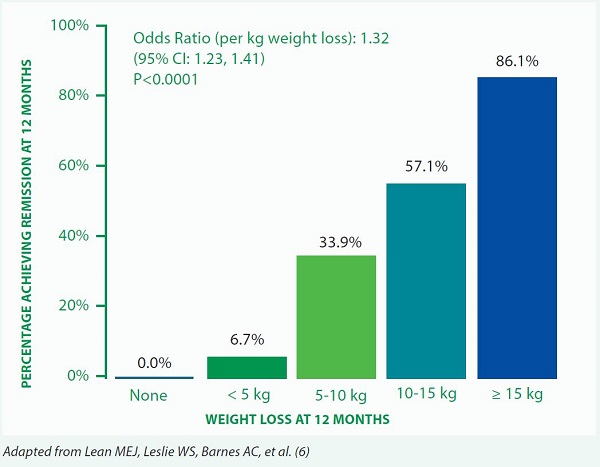Diabetes mellitus has always been a major health challenge for Singapore, and it has become such a big problem in recent years that our Government declared war on diabetes in 2016. As of 2014, there were already 440,000 Singapore residents aged 18 years and above who had diabetes, and this figure is projected to increase to 1,000,000 by 2050. The cost to treat diabetes would thus become even more astronomical, from costing $940,000,000 in 2014 to a projected $1.8 billion in 2050! From previous surveys, one in three diabetics was also found to have poor control of their diabetes.
Conventional medical wisdom has long regarded type 2 diabetes mellitus (T2DM) as a chronic disease, capable of amelioration alone. For many, their experience would be of a steady increase in blood sugar with no cure in sight. Beta-cell function correspondingly declines inexorably over time, associated with a steady decrease in beta-cell mass. After ten years of T2DM, 50% of such patients would require insulin in order to maintain good glycaemic control.
However, evidence has begun to emerge of the potential reversal of T2DM in patients undergoing bariatric surgery, with normalisation of blood glucose levels within days of the procedure long before any major weight loss had occurred. There was also evidence that moderate energy restriction could lead to improved blood sugar control.
In light of this, a group of researchers in Northern England hypothesised that the effect of profound negative energy balance on the metabolism leads to the post bariatric surgery effect. By decreasing intracellular fatty acid concentrations in the liver, the consequent lower export of lipoprotein triacylglycerol to the pancreas allows beta cell recovery by a reduction of the chronic inhibitory effects of excess fatty acid exposure. This hypothesis culminated in a preliminary study published in 2011 that demonstrated for the first time that pancreatic beta cell function and insulin resistance could be normalised by acute negative energy balance alone. After a week of dietary restriction, fasting glucose had reduced from 9.2+/- 0.4 mmol/l to 5.9+/-0.4 mmol/l (p=0.003). The first-phase insulin response increased from 0.19+/- 0.02 mmol/min/m2 to 0.46 +/-0.07 mmol/min/m2 (p<0.001). Insulin suppression of hepatic glucose output improved from 43+/-4% to 74+/-5% (p=0.003). Hepatic and pancreatic triacylglycerol both decreased from 12.8+/-2.4% and 8.0+/-1.6%, respectively, to 2.9+/- 0.2% and 6.2+/-1.1%, respectively.
In conclusion, this study showed that by eating very much less, (in this case, 600 kcal per day for eight weeks), diabetes mellitus could be reversed.
Although the results of this study were very striking, it had clear limitations, not least that it only had 11 subjects matched to eight controls. However, it sets the stage for subsequent studies to follow.
In December 2017, the same research group published an article reporting on a much larger study they had conducted on 306 subjects in 49 primary care practices in Northern England and Scotland. The subjects were between 20 and 65 years old, diagnosed with T2DM in the previous six years, with a body mass index of 27-45 kg/m2 and were not on insulin. In this open-label, cluster-randomised Diabetes Remission Clinical Trial (DiRECT), participating practices were randomly assigned to provide either a weight management programme (intervention) or best practice by guidelines (control). Intervention comprised of withdrawal of antidiabetic and antihypertensive drugs for the intervention group participants. The participants were put on a very strict total diet replacement of around 825 to 853 kcal per day formula diet for three months, followed by a two- to eight-week food reintroduction, structured support for long-term weight loss maintenance thereafter and monitored over 12 months. The aims were to achieve weight reduction of 15 kg or more and remission of diabetes (defined as having a HbA1c of less than 6.5% after at least two months without diabetic medication). Acute weight loss and low energy formula diets are associated with an acute drop in blood pressure, hence the withdrawal of the antihypertensives. Antihypertensives are reintroduced only if the systolic blood pressure exceeds 140 mmHg.

The results of this large primary care-based study were quite astonishing. After 12 months, 24% of the participants achieved weight loss of 15 kg or more. Overall, 46% of the participants achieved diabetes remission. Remission depended very much on the amount of weight loss, with 7% in those with 0 kg to 5 kg loss, 34% in those who lost 5 kg to 10 kg, 57% in those who lost 10 kg to 15 kg, and 86% in those who lost 15 kg or more. Almost 50% of those who participated in their study achieved remission to a non-diabetic state and were off antidiabetic medication, and 68% of the intervention group also remained off antihypertensive drugs at 12 months. The authors concluded that remission of T2DM should become a practical aim for primary care.
DiRECT clearly demonstrated that T2DM of up to six years' duration could potentially be reversed. Furthermore, it showed that weight loss of sufficient magnitude for remission could certainly be attainable by individuals in a non-specialist primary care setting manned by primary care staff.
More research, of course, needs to be done on this. Meanwhile, for those of us working in primary care, we need not tarry, and should take this as ample encouragement for us to try to do the same for all our diabetic patients.
Notes
- Extrapolation based on National Health Survey 2010, Ministry of Health, Singapore.
- Projection done by Saw Swee Hock School of Public Health, Singapore.
- Ministry of Health, Singapore.
- Poor control is defined as having HbA1c >= 8%.
- Lim EL, Hollingsworth KG, Aribisala BS, et al. Reversal of type 2 diabetes: normalisation of beta cell function in association with decreased pancreas and liver triacylglycerol. Diabetologica 2011; 54(10):2506-14.
- Lean MEJ, Leslie WS, Barnes AC, et al. Primary care-led weight management for remission of type 2 diabetes (DiRECT): an open-label, cluster-randomised trial. Lancet 2018; 391:541-51.